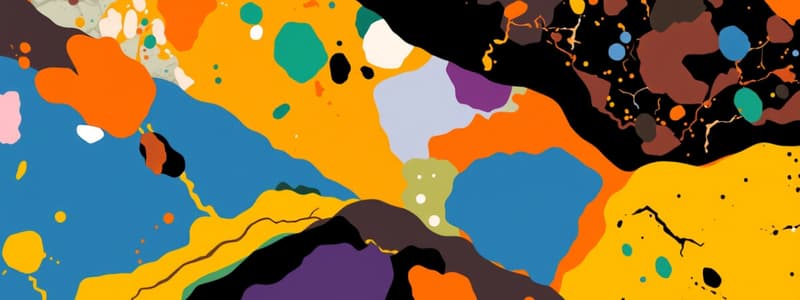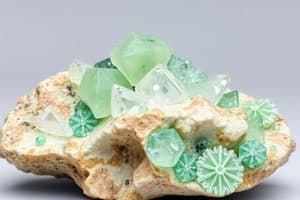Podcast
Questions and Answers
Which factor primarily influences the hardness of a mineral?
Which factor primarily influences the hardness of a mineral?
- The temperature of the environment
- The size of the mineral
- The mineral's color
- The type of chemical bonds present (correct)
What is the correct reason for testing only on fresh mineral surfaces?
What is the correct reason for testing only on fresh mineral surfaces?
- To prevent scratches from previous tests (correct)
- To determine the mineral's age
- To enhance the mineral's visual appearance
- To avoid introducing impurities
How is cleavage in minerals defined?
How is cleavage in minerals defined?
- By the tendency to break in any direction
- By the surface appearance of the mineral
- By the color and texture of the mineral
- By the ability to split easily in specific directions (correct)
Which of the following is NOT a characteristic for determining the cleavage of a mineral?
Which of the following is NOT a characteristic for determining the cleavage of a mineral?
What is suggested as a good practice when testing the hardness of minerals?
What is suggested as a good practice when testing the hardness of minerals?
What type of twinning involves a definite composition surface?
What type of twinning involves a definite composition surface?
Which type of twin is characterized by repeated twins that are not parallel?
Which type of twin is characterized by repeated twins that are not parallel?
In twinning, what is the term used for rotation about a crystal direction?
In twinning, what is the term used for rotation about a crystal direction?
What describes polysynthetic twins?
What describes polysynthetic twins?
Which statement about twin centers is correct?
Which statement about twin centers is correct?
What term describes the tendency of a mineral to break or split easily in certain directions?
What term describes the tendency of a mineral to break or split easily in certain directions?
Which type of cleavage allows a mineral to break along one direction?
Which type of cleavage allows a mineral to break along one direction?
What type of fracture exhibits a smooth, curved surface?
What type of fracture exhibits a smooth, curved surface?
What does effervescence indicate in a mineral?
What does effervescence indicate in a mineral?
Which property describes a mineral's ability to transmit light?
Which property describes a mineral's ability to transmit light?
Which of the following fractures shows fibers or splinters?
Which of the following fractures shows fibers or splinters?
What does ferromagnetic indicate regarding a mineral's properties?
What does ferromagnetic indicate regarding a mineral's properties?
Which of the following forces causes a mineral to acquire an electric charge when subjected to mechanical stress?
Which of the following forces causes a mineral to acquire an electric charge when subjected to mechanical stress?
What is the term for the resistance of a mineral to breaking or tearing?
What is the term for the resistance of a mineral to breaking or tearing?
Halite is characterized by which distinctive property?
Halite is characterized by which distinctive property?
What primarily determines the color of a mineral?
What primarily determines the color of a mineral?
Which term describes the appearance of a mineral's surface in reflected light?
Which term describes the appearance of a mineral's surface in reflected light?
What is meant by the term 'habit' in mineralogy?
What is meant by the term 'habit' in mineralogy?
What is the purpose of the Mohs Hardness Scale?
What is the purpose of the Mohs Hardness Scale?
Which mineral has a hardness of 3.5 on the Mohs Scale?
Which mineral has a hardness of 3.5 on the Mohs Scale?
In terms of mineral color, what role do trace elements play?
In terms of mineral color, what role do trace elements play?
What is the 'streak' of a mineral?
What is the 'streak' of a mineral?
Why are optical methods used for testing hardness in some minerals?
Why are optical methods used for testing hardness in some minerals?
A mineral exhibits a strong pleochroism. This would imply which of the following?
A mineral exhibits a strong pleochroism. This would imply which of the following?
Which of these minerals is characterized by the presence of the Cr3+ ion and exhibits a green color?
Which of these minerals is characterized by the presence of the Cr3+ ion and exhibits a green color?
What is the primary reason for differences in the color of an identical mineral sample?
What is the primary reason for differences in the color of an identical mineral sample?
Which mineral is commonly used as a reference point for a hardness of 7 on the Mohs scale?
Which mineral is commonly used as a reference point for a hardness of 7 on the Mohs scale?
If a mineral has a metallic luster, what can be inferred about its surface?
If a mineral has a metallic luster, what can be inferred about its surface?
Which of the following is NOT a method for measuring mineral hardness?
Which of the following is NOT a method for measuring mineral hardness?
Study Notes
Physical Properties of Minerals
- Color is determined by the wavelengths of light that a mineral reflects, influenced by mineral chemistry and structural factors.
- Streak is the color of a mineral when powdered, providing consistent identification.
- Luster refers to the appearance of a mineral's surface in reflected light, important for mineral classification.
- Habit describes the general shape of a crystal, including forms such as dendritic, botryoidal, micaceous, bladed, acicular, and massive.
Hardness
- Hardness measures a mineral's resistance to scratching, assessed using the Mohs Hardness Scale (1 to 10).
- Talc (1) to Diamond (10) serve as benchmarks for hardness, with various minerals corresponding to common objects for practical comparison.
- Knoop and Vickers methods provide absolute hardness values, suitable for different specimen types.
Cleavage and Fracture
- Cleavage indicates the tendency of a mineral to break along specific planes, characterized by the number and quality of these planes.
- Fracture is the surface appearance when a mineral does not cleave; varieties include conchoidal, fibrous, hackly, and uneven.
Other Properties
- Effervescence occurs when carbonate minerals react with acid, producing CO2 gas.
- Diaphaneity describes a mineral's ability to transmit light, classified as opaque, translucent, or transparent.
- Iridescence results from interference of light, creating shimmering colors.
- Magnetism can be ferromagnetic, paramagnetic, or diamagnetic, indicating different magnetic properties.
- Piezoelectricity and pyroelectricity refer to the generation of electric charge in response to mechanical stress or temperature changes, respectively.
Specific Gravity and Tenacity
- Specific gravity is the density ratio of a mineral compared to water, important for mineral identification.
- Tenacity reflects a mineral's resistance to breaking, crushing, bending, or tearing, indicating structural integrity.
Twinning
- Twinning involves crystallographically-controlled intergrowths of two or more crystals, resulting in unique compositions and orientations.
- Types of twins include contact, penetration, polysynthetic, and cyclic, each defined by specific attribute patterns and orientations.
Studying That Suits You
Use AI to generate personalized quizzes and flashcards to suit your learning preferences.
Description
This quiz covers the physical properties of minerals, including color, streak, luster, habit, hardness, and cleavage. Understanding these properties is essential for identifying and classifying minerals in Geol 103: Elementary Mineralogy. Prepare to test your knowledge on these fundamental concepts.




